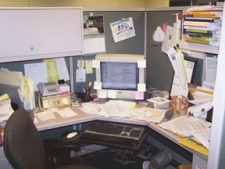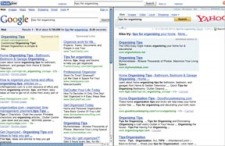|  | |
I'm learning how to streamline my life.
If I can do it, you can, too.
By Debbie Gardner
PRIME Editor
OK, I'll admit it. There are days when I can't find what I need on my desk.
Either of my desks , the one where I spend my work life at Reminder Publications or the one in the corner of our sunroom where I keep all my home-related paperwork.
Yes, I have piles. And overstuffed files. And misplaced notes (though no lost bills yet, thank goodness!).
I never intended to have such disorganized desks. The disorganization, it seems, just sort-of happened.
I have lots of theories about how my clutter happened.
My favorite is lack of time. I do many jobs at Reminder Publications, which means I often have multiple projects going at the same time.
Because I'm afraid I'll forget something vital in one of these projects, I tend to leave the files on my desktop. And because I'm so busy making sure all the projects get done, I tell myself I don't have the time to file away the end results.
The result everything is always on top of my desk, often in piles that end up being stacked on top of other project piles when I have to start something new.
My home desk suffers from the same malady. As a working mom, my time to handle paperwork at home often gets squeezed in between myriad other chores and obligations. Add to that the files and papers that go with a second job in this case a small home-based business and you can see where the rub can lie.
The paralyzing power of piles
As I've waded through this mess for the past year or so, I've come to understand the curse of clutter.
Just looking at a disorganized space can make you feel tired and unmotivated. It can even be depressing and disheartening. Clutter affects your self esteem. And the thought of dealing with it, even if you want to make a change, can leave you feeling paralyzed and overwhelmed.
A cluttered environment can really make it hard to get excited about your job, or even get your work done.
Choosing to clear the clutter
Sometimes it seems easier just to leave the mess and work around it. I tried that for a while, but of late have found that the clutter is cutting into my productivity and I missed the deadline on a story for a favorite contact (the notice got misfiled in my piles).
I decided it was time to tackle the problem.
|
Organizing quick tips
By Debbie Gardner
PRIME Editor
A prescription for getting organized
Here is The Clutter Doctor's three- step prescription for getting organized:
1. Examine your space.
Take a good look at what you have to work with and decide what this space will be used for.
2. Diagnose your clutter.
"Go through your things and decide what will stay and what should go," said Fisher-Hoffman.
She stressed that this sorting process should be done in "small increments of time - a half-hour to an hour."
3. Prescribe a treatment.
"Now that you have gone through everything - and you know how much you have go out and get buckets and bins," she said. "Then decide how things are going to get stored and where."
Potential "homes" for your unwanted things
Sure, you can take your unwanted stuff to one of the major donation centers, but here are some other places that might think your trash is a treasure:
Senior Centers (Books and arts & crafts supplies - but call first!)
Daycare Centers (Children's books and CDs/Movies; some art materials again call first)
Libraries - books, CDs,Videotapes and DVDs.
The Survival Center in Indian Orchard - Household goods and clean, usable clothing.
The Springfield Rescue Mission- good, clean, usable men's clothing
Women's Shelter Campanaros old cell phones (clear private data first!)
Themed Museums - toys, collections, etc.
Also check with local churches to see if they are collecting certain types of goods for a specific cause.
A three-step plan
for staying organized
Once you've made the commitment to getting organized, how can you keep from backsliding?
The Clutter Doctor offers these three simple tips:
1. Remember that everything has a home.
2. When you take it out, put it back!
"It may take time for this to become automatic," Fisher-Hoffman said. "Remember, it takes 30 days for a conscious action to become a habit."
3. Respect your newfound open space.
"Now that you have a clean space, don't feel you have to clutter it back up," she said. "It's OK to have open, free space!"
Local Support Group
The Clutter Doctor facilitates a free monthly support group for clutterers at the Chicopee Library:
Date: Second Thursdays
Time: 6:30 p.m.
Location: Chicopee Main Library 449 Front St.
Contact: Carol Bagley 413-594-1800 x108 
